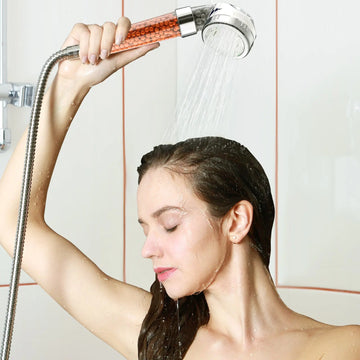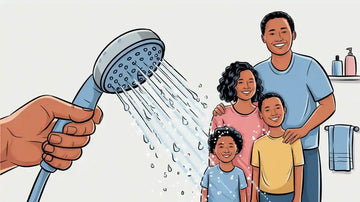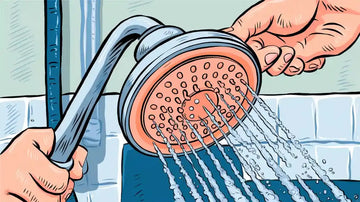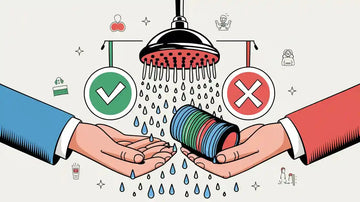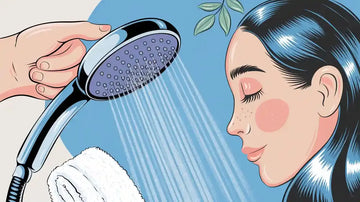Cleaning your shower head can be accomplished without using vinegar. If you’re looking for alternative methods that work effectively, there are plenty of options to explore. Whether you dislike the smell of vinegar or are concerned about its impact on certain materials, you can still achieve great results. Let’s dive into how to clean shower head without vinegar and maintain its sparkle.
Key Takeaways
Clean your shower head often to stop mineral buildup. Wiping it weekly helps keep water flowing well.
Try baking soda or lemon juice instead of vinegar for cleaning. These are safe for surfaces and make your shower smell nice.
Use a filtered shower head to lower mineral deposits. This can also make your water better and showers more enjoyable.
Why You Need to Clean Shower Heads
Effects of Mineral Buildup
Mineral deposits can sneak up on your shower head over time, especially if you live in an area with hard water. These deposits, often made of calcium and magnesium, clog the tiny holes in your shower head. When this happens, the water flow weakens, and your shower experience becomes less enjoyable.
But it’s not just about water pressure. Mineral buildup can also create a breeding ground for bacteria and mold. This can lead to unpleasant odors and even health risks. Plus, those white or green crusty spots on your shower head? They’re not just unsightly—they can damage the material if left untreated.
Tip: If you notice reduced water pressure or uneven spray patterns, mineral buildup might be the culprit. Cleaning your shower head regularly can help prevent these issues.
Signs Your Shower Head Needs Cleaning
How do you know it’s time to give your shower head some TLC? Here are a few telltale signs:
Weak water pressure: If your shower feels more like a drizzle than a downpour, mineral deposits might be blocking the flow.
Uneven spray patterns: Water spraying in odd directions or missing holes is a clear sign of clogging.
Visible buildup: White, green, or brown crusty spots on your shower head are a dead giveaway.
Unpleasant odors: A musty smell during your shower could mean bacteria or mold is thriving inside the shower head.
Keeping an eye out for these signs can help you catch problems early and keep your shower running smoothly.
Why Avoid Vinegar for Cleaning
Possible Damage to Materials
Vinegar might not be the safest cleaner for your shower head. Its strong acid can harm some materials, like brass or nickel. Over time, it can make the surface look dull or even weaken it. If your shower head is expensive or has special coatings, vinegar might ruin its quality.
Tip: Always read the cleaning guide from the maker to avoid damage.
Strong Smell and Sensitivities
Vinegar’s strong smell can stick around after cleaning. Some people find this smell unpleasant or even irritating. Those with allergies, kids, or breathing problems might feel uncomfortable with it.
Here’s how strong smells like vinegar can affect sensitive spaces:
Key Findings |
Description |
|---|---|
Being around strong smells like vinegar for a long time can affect sensitive creatures like Drosophila melanogaster. |
|
Getting Used to Smells |
Flies adjust to bad smells over time, but it still affects them at first. |
Selective Reactions |
Repeated smells change reactions to known odors but not new ones. |
If vinegar’s smell is too much for you or your family, try gentler options.
Other Reasons to Skip Vinegar
Using vinegar can be tricky and messy. Soaking your shower head in a bag of vinegar can spill easily. It also doesn’t work well with some cleaning tools or mixes. For example, vinegar can reduce the power of baking soda or store-bought cleaners.
For an easier clean, try lemon juice or baking soda. These are simple to use and don’t leave a strong smell.
How to Clean Shower Head Without Vinegar
Using Baking Soda Paste
Baking soda is a fantastic option when you want to clean shower head without vinegar. It’s gentle yet effective, making it safe for most materials. To get started, mix baking soda with a little water to create a thick paste. You’ll want the consistency to be similar to toothpaste.
Here’s how you can use it:
Remove the shower head if possible. This makes cleaning easier.
Apply the baking soda paste generously to the surface, focusing on areas with visible buildup.
Let it sit for about 15 minutes. This gives the paste time to break down the mineral deposits.
Use a soft brush or an old toothbrush to scrub the surface. Pay attention to the nozzles where water flows out.
Rinse thoroughly with warm water and reattach the shower head.
Tip: If the buildup is stubborn, repeat the process or soak the shower head in warm water after applying the paste.
Baking soda is a reliable choice for vinegar-free methods. It cleans effectively without damaging your shower head.
Cleaning with Lemon Juice
Lemon juice is another excellent way to clean shower head without vinegar. It’s natural, smells great, and works wonders on mineral deposits. The mild acidity of lemon juice helps dissolve grime while leaving your shower smelling fresh.
Follow these steps:
Cut a fresh lemon in half and squeeze the juice into a bowl.
Dip a soft cloth or sponge into the juice and rub it onto the shower head.
For tougher spots, sprinkle a little salt onto the lemon half and scrub directly with it. The salt adds a gentle abrasive action.
Let the lemon juice sit for 10–15 minutes to work its magic.
Rinse the shower head with warm water and wipe it dry with a clean cloth.
Note: Lemon juice is safe for most materials, but if your shower head has a special coating, test it on a small area first.
This method not only cleans but also leaves your bathroom smelling citrusy and fresh.
Applying Commercial Cleaners
If you prefer a ready-made solution, commercial cleaners designed for shower heads are a great choice. These products are formulated to tackle stubborn mineral deposits and grime effectively.
Here’s how to use them:
Read the instructions on the cleaner’s label. Some may require dilution, while others can be applied directly.
Spray or apply the cleaner onto the shower head, ensuring all areas are covered.
Allow it to sit for the recommended time. This step is crucial for breaking down tough deposits.
Scrub gently with a soft brush to remove any remaining buildup.
Rinse thoroughly with water and dry the shower head with a towel.
Commercial cleaners are convenient and powerful. They’re especially useful if you’re dealing with heavy buildup or want a quick solution.
Manual Cleaning with a Brush
Sometimes, a little elbow grease is all you need to clean shower head without vinegar. A soft brush or an old toothbrush can help you reach those tiny nozzles and crevices.
Here’s what to do:
Detach the shower head if possible. This gives you better access to all areas.
Use warm water to rinse off loose debris.
Dip the brush in soapy water or a mild cleaning solution.
Scrub the surface and nozzles thoroughly. Focus on areas with visible buildup.
Rinse the shower head under running water and dry it with a clean cloth.
Pro Tip: For nozzles that are clogged, use a toothpick or a needle to gently clear them. Be careful not to damage the material.
Manual cleaning is simple yet effective. It’s a great option if you don’t have other cleaning supplies on hand.
Prevention Tips to Minimize Mineral Deposits
Regular Cleaning Routine
The best way to prevent mineral deposits is by cleaning your shower head regularly. You don’t need to wait until water pressure drops or crusty spots appear. A quick wipe-down every week can make a big difference.
Here’s a simple routine you can follow:
After your shower, use a damp cloth to wipe the surface of the shower head.
Check the nozzles for any visible buildup. If you spot any, gently scrub them with a soft brush.
Once a month, give your shower head a deeper clean using baking soda paste, lemon juice, or a commercial cleaner.
By staying consistent, you’ll save yourself from dealing with stubborn buildup later. Plus, keeping your shower head clean ensures a steady water flow and a more enjoyable shower experience.
Tip: Set a reminder on your phone or calendar to clean your shower head. It’s easy to forget, but a little effort now can save you time and hassle in the future.
Installing a Filtered Shower Head
If you live in an area with hard water, a filtered shower head can be a game-changer. These shower heads are designed to reduce the amount of minerals, chlorine, and other impurities in your water. By filtering out these substances, you’ll notice less buildup on your shower head and even softer skin and hair.
One excellent option is the Cobbe DS Filter Shower Head. It features a 20-stage filtration system that removes harmful substances like chlorine and heavy metals. This not only helps in keeping your shower head clean but also improves your overall shower experience. With multiple spray modes and a sleek design, it’s a practical and stylish addition to your bathroom.
Why it matters: A filtered shower head doesn’t just protect your shower head from mineral deposits. It also enhances your health by providing cleaner water.
Drying the Shower Head After Use
Water left sitting on your shower head can lead to mineral deposits over time. Drying it after each use is a simple yet effective way to prevent buildup.
Here’s how you can do it:
After you finish your shower, take a clean, dry towel and gently pat the shower head.
Pay extra attention to the nozzles, as water tends to collect there.
If your shower head is detachable, shake it gently to remove any excess water.
This small habit can go a long way in keeping your shower head clean. It also helps reduce the chances of mold or bacteria growing inside.
Pro Tip: If you’re in a rush, you can use a hairdryer on a low setting to quickly dry your shower head.
By following these prevention tips, you’ll spend less time scrubbing and more time enjoying a refreshing shower.
You don’t need vinegar to clean your shower head. Use baking soda, lemon juice, or store-bought cleaners instead. Simple habits like drying it or using a filter help too. Follow these ideas now for a cleaner and better shower!
FAQ
How often should I clean my shower head?
You should clean your shower head at least once a month. Regular cleaning prevents mineral buildup and keeps your water flow strong and consistent.
Can I use dish soap to clean my shower head?
Yes! Dish soap works well for light cleaning. Mix it with warm water, scrub with a brush, and rinse thoroughly for a quick refresh.
What’s the best way to prevent mineral buildup?
Install a filtered shower head, like the Cobbe DS Filter Shower Head. It reduces minerals and impurities, keeping your shower head cleaner for longer.
Tip: Dry your shower head after each use to minimize water spots and deposits.
